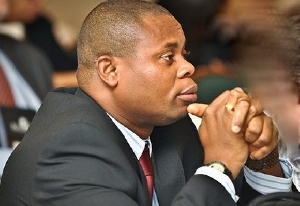GENERAL NEWS
IMANI, ACEP lose funders – Report

A report issued by IMANI Africa has revealed that the think tank lost three major funders due to the outbreak of the coronavirus.
Founding President of IMANI, Frankin Cudjoe, revealed this in a statement that was issued after an IMANI-GIZ Policy Dialogue on COVID-19 and its Impact on Ghanaian Businesses, on Tuesday, December 1.
“Regarding the impact of the pandemic on Civil Society Organisations (CSOs), Benjamin Boakye, Executive Director, Africa Centre for Energy Policy (ACEP) argued that the pandemic period was a difficult time for the think tanks to survive. He indicated that projects that they were running which were funded by external partners were cancelled during the pandemic. That meant ‘you had to look to where you can cut at the top to feed those beneath to ensure the business continues’.”
“This was buttressed by Mr Franklin Cudjoe, who indicated that they (CSOs) have been suffering silently for so long and will not have told their story.
“He indicates that IMANI lost about three major funders due to COVID-19. He notes that as an organisation that sells ideas which can be traded across wavelengths, management is now considering working completely from home,” the statement said.
Below is the full statement:
Press Statement
December 1, 2020
Rare Insights from IMANI-GIZ Policy Dialogue on COVID-19 and its Impact on Ghanaian Businesses
IMANI Centre for Policy and Education and the Deutsche Gesellschaft für Internationale Zusammenarbeit GmbH (GIZ) have partnered to carry out a series of six (6) policy dialogues to improve the business climate in Ghana. The first of the dialogues, which took place on November 26, 2020, at Tang Palace Hotel in Accra, brought together top executives from the private sector, public sector, civil society organisations, academia and the media to discuss the challenges and opportunities created by the COVID-19 pandemic on Ghanaian businesses. The event enabled participants to share their practical lessons prior, during and after the lockdown restrictions that were imposed by the government of Ghana.
Mr Franklin Cudjoe, Founder and CEO of IMANI indicated that the programme is part of the private sector-focused conversations which are meant to light the pathway for the next administration that will take the helm of affairs in January 2021. The event was moderated by the business journalist Mr George Wiafe who engaged eight (8) panellists and the participants to share their unique experiences. A short survey accompanied this to explore some insights from participants.
The following are some of the highlights of the points made during the event.
Mr Senyo Hosi, CEO of Chamber of Bulk Oil Distributors (CBOD) listed that the issues needing attention include: (1) harnessing the 4th Industrial Revolution (4IR); (3) improving Ghana’s human resource capacity to be competitive; and (3) revising Ghana’s economic development philosophy to increase more local participation. He reiterated the notion that it appears nothing will change after COVID-19, because at the national level, not much futuristic thinking is going into developing policy that adapts to changing circumstances.
Ms Mabel Simpson, Team Lead, Msimps, recounted that there were both bad days and good days for her company at the height of the pandemic. However, she indicates that they did not shut down as they were ready to survive the pandemic. The pandemic created many business opportunities for them. She indicated that it was needful to strategize as their products include laptop bags which were not in demand. On the other hand, everyone needed face mask so the business diverted resources to meet the demand for face masks. Moreover, one of the strategies was to house the employees who were engaged in the production of the masks, which was the best option during the lockdown. It also ensured that the production team could maintain high-quality products which are not infested by the virus.
Mrs Charity Annan Adupong, CEO, Meannan Foods, recollects that the pandemic caused her company to “start looking [locally] within” the economy to market their products. Initially, 25% to 30% of their products were being exported to Europe and America, but because of the pandemic, the exports were negatively affected, and they later realised they have not even “scratched the face of what people need” locally.
Mr David Ofosu-Dorte, Managing Partner, AB & David Business Law Firm, said that many businesses were not prepared for the COVID-19 shock as they do not have adequate business continuity plans. Even for the firms that have these plans, he argued they could not have imagined the shock will come from the pandemic to prepare ahead of it. He noted that during the pandemic, many businesses were not able to activate the business continuity plans. Going forward, he noted that there is the need first to sustain the business in its current state; secondly, prevent deterioration; and thirdly, strategise to take advantage of opportunities that may emerge. He also indicated that he does not think many things will change after the COVID-19 pandemic. He based this assertion on the inaction witnessed from duty bearers and policymakers after national disasters like the May 9, 2001 disaster at the Accra Sports Stadium, the 2015 Accra explosion (GOIL Station) and 2020 Odawna Pedestrian Market Fire.
Mr Enoch Kwasi Gyetuah, National Executive Director, Ghana National Council of Private Schools indicated that the pandemic has significantly affected private schools. Although some schools are not in session, the authorities are still required to honour some statutory payments. He argued that “in terms of policy direction, the government has not thought of how best these private schools which contribute to over 41% in terms of pre-tertiary education delivery will be sustained.” He posited that regulatory flexibility is needed.
Mr Nlaliban Wujangi, CEO, Agriculture and More Limited asserted that the demand situation has been topsy turvy due to COVID-19. Demand for their products increased by about 40% to 60% with the announcement of a lockdown which got them excited. However, demand dipped during the lockdown as movements were inhibited. After the lifting of the ban, demand normalised again to a level which is better than pre-COVID-19 figures. Nlaliban indicated that it was difficult to increase the prices of products as there is a humanitarian crisis which needs to be addressed as well. He believes that his business will not just survive, but it will thrive over the foreseeable future.
Dr Joseph Obeng, President, Ghana Union of Traders’ Association (GUTA) lamented that cash deposits of traders were locked up, the ordering patterns of their goods distorted, and the delivery dates were not known anymore to traders. Interestingly, the emergence of the new e-commerce systems became the “new normal”, which took some traditional businesses out of business. He hints that GUTA aims to buy from local sources but can only obtain about 10% from the entire African continent. He expressed worry about the cost of borrowing, which continues to be high and with COVID-19 losses and capital depletion, businesses will face challenges.
Dr Edith Dankwa, Founder, Ghana Economic Forum (also Business and Financial Times – B&FT) notes that for her business, the financial sector clean-up negatively affected them and entering into 2020, they had high hopes of turning their business around. This is because, in 2017, 2018 and 2020, they witnessed low revenues – about 60% decrease. She believed their survival was because they were an innovative entity which already had a presence in the digital space. Moreover, learnings from the financial sector crisis had made them much prepared for the effects of the pandemic. They were initially worried about how they will pay their employee salaries, cover operating costs and pay for production line printing press costs, but they witnessed a faster turnaround. As regards government commitment to the business community, she questions, “What kind of enabling environment are we giving businesses to thrive?”. She advises the government to “listen to businesses because businesses may be suffering”.
There were also some insightful feedback and points raised by the participants at the event.
Mrs Mona Helen Quartey, Former Deputy Minister of Finance, complained about the vulnerability that accompanies the pandemic as inclusion was not attained. She argues that the business community in Ghana lacks when it comes to Economic Social Governance (ESG) performance. She bemoaned that businesses did not have the needed corporate governance structures to support what has happened. She indicated that there was some readiness for Ebola, but because it was not felt, the lessons were not learnt for replication in the case of COVID-19 outbreak.
Mr Seth Twum Akwaboah, CEO, Association of Ghana Industries notes that about 80% of industries believe that all things being equal with no second wave, by July 2021 they should be able to fully recover. He indicates that the COVID-19 situation taught businesses to focus internally to produce to meet local demands. Demand patterns also changed, and those producing some essential commodities were able to take advantage of it. He argued that in the short-run businesses cannot change the factors of production, so it is not able to change to produce all the goods needed in the market.
Regarding the impact of the pandemic on civil society organisations (CSOs), Mr Benjamin Boakye, Executive Director, Africa Centre for Energy Policy (ACEP) argued that the pandemic period was a difficult time for the think tanks to survive. He indicates that projects that they were running which were funded by external partners were cancelled during the pandemic. That meant “you had to look to where you can cut at the top to feed those beneath to ensure the business continues”. This was buttressed by Mr Franklin Cudjoe, who indicated that they (CSOs) have been suffering silently for so long and will not have told their story. He indicates that IMANI lost about three major funders due to COVID-19. He notes that as an organisation that sells ideas which can be traded across wavelengths, management is now considering working completely from home.
Mr John Awuah, CEO, Ghana Association of Bankers (GAB) indicates that people are not speaking so much about the banking industry because the industry was extremely prepared for the pandemic. There are narratives that banks changed to using digital platforms, but the platforms were already built, it is only that due to human nature, consumers found it difficult to switch. However, due to COVID-19 consumers had no choice but to switch, leading to an increase in patronage. For the various government interventions, the banking industry was deeply involved so that COVID-19 response programmes are bankable projects that banks can support. Thus, as an industry, he indicates, they believe they have “done a yeoman’s job so far”. For the educational sector, he argues that banking support was not in the form of additional funding but rather in the form of payment breaks with some going as long as one year of repayment holidays.
Mr Emmanuel. K. Bensah Jr., Deputy Executive Director, AfCFTA Policy Network Ghana highlighted the need for sensitisation of people and businesses, engagement of government to be committed to pulling everyone along from top to bottom before the AfCFTA implementation commences in January 2021.
Godfred A. Bokpin, Professor, University of Ghana & Fellow, IMANI CPE argued that there is a box which has not been checked as a country and that relates to the kind of recovery that is expected. COVID-19 might have added some layers but has exposed the existing challenges, inequalities and poverty of opportunities. He argues that to the average Ghanaian, there is nothing national about the national cake. He quizzes whether the recovery is pulling people along or it is the same jobless economic growth which has been celebrated over the years. He indicates there is the need to go beyond the gross domestic product (GDP) figures or macroeconomic stability because nobody eats macroeconomic numbers.
Mr Immanuel B. Nartey-Tokoli, Managing Director, Jekora Ventures, indicated that the waste management sector has great potential but has received less attention. He believes the sector can create secondary and tertiary materials that have a positive impact on climate change and reduce waste. He indicated that waste management companies were negatively impacted. He lamented that despite being classed by the Imposition of Restrictions Act, 2020 (Act 1012) as providers of essential services, they were not considered when it came to the distribution of stimulus packages. He indicated that as economic activity declined during the lockdown, their business activities declined, and revenues decreased by about 60%. However, he indicated they strategised their operational model to depend more on less expensive equipment, continued service delivery and used larger volume equipment.
Mr Isaac Adupong, Director, Lead-It Africa Limited, noted that during the COVID-19 period, they conducted some studies on how some businesses were able to be resilient over time. He argues that although some narratives tend to focus on the resilient of the system, it is clear from the studies that resilience of businesses is driven from the resilient of the employees. Thus, companies with resilient employees before COVID-19 can survive, as well as generate more ideas and creativity. He argued that the businesses would continue to depend on employees for ideas, and it is essential for management to engage and inspire the employees.
The IMANI-GIZ Policy dialogue aims to garner all the experiences to generate policy-relevant information to enable the next government to improve the business climate in Ghana.
Results of IMANI’s COVID-19 Business Impact Survey
As part of efforts to provide some empirical insights from participants of the policy dialogue, IMANI Africa conducted a short-structured survey to obtain simple and prompt feedback. The questions hinge on the impact of the pandemic on businesses and what businesses are doing to address them. 24 respondents completed the survey, from different sectors, including education, professional services (attorney, accountant, consultants, engineers), and public services, among others. Some of the questions allowed respondents to choose multiple responses, when necessary.
The first feedback sourced was on the impact of COVID-19 on the operation of businesses. The results indicate that majority of respondents (9, 20%) restricted spending because of the uncertainty created by the pandemic. This is followed by the complete closure of the physical place of business of the businesses (8, 18%). Some businesses also adjusted their hours of operation while others have experienced a decline in sales during the pandemic. The entire supply chains of businesses have been interrupted by the pandemic. There are other actions taken by businesses because of the impact of the pandemic on operations. Some have diversified, some halted their investment activities while others have increased expenditure in procuring personal protective equipment (PPEs).
To obtain a more situational insight of where businesses stand currently, the respondents were asked about the level of impact they expect the pandemic to have on their business. 50% of the respondents (N=12) rated the impact as medium, 29% rated the impact as low while 21% ranked it as high. This suggests that for the 2020 and 2021 financials of about 71% of businesses will be impacted negatively by the pandemic. This suggests that businesses, the industries and the government have to develop and implement policies to lower the negative effects of the pandemic on the business climate in Ghana.
Another aspect of the survey assesses what businesses are doing to address employee and customer concerns to mitigate the risk exposures from COVID-19. Interestingly, majority of the respondents are still monitoring the situations as they unfold. This is very interesting as the Ghanaian business space does not operate in a silo, but local businesses are linked to the global business space. Thus, it is essential for businesses to monitor events, although the COVID-19 cases and deaths in Ghana are comparatively low. In line with government restrictions during the lockdown and post-lockdown, respondents indicate they have restricted in-person gatherings to a certain number, are providing sanitisers and routinely sharing updates with employees and customers. They are also encouraging employees to work from home, and the use of technology in businesses has increased, albeit not widespread.
In conclusion, both the policy dialogue and follow-on survey indicates that the pandemic has affected businesses, significantly impacting financial profitability for 2020 and 2021. That notwithstanding, there are signals that the businesses are taking strategic steps to mitigate the risks posed by the pandemic. Also, one lesson learnt from the pandemic is that businesses must leverage and take up the opportunities that the Africa Continental Free Trade Area (AfCTA) presents. This cannot be achieved without government’s commitment to developing and implementing optimal policies on the following: reducing corruption; improving cross-border trade; access to low-interest credit; improving the ease of business registration and regulation; efficient tax administration; and providing affordable energy.
-

 Lifestyle3 weeks ago
Lifestyle3 weeks agoRoad Safety Authority narrates how buttocks causes road accident
-

 GENERAL NEWS4 weeks ago
GENERAL NEWS4 weeks agoWhy 15 police officers stormed Owusu Bempah’s church – Kumchacha narrates
-

 GENERAL NEWS3 weeks ago
GENERAL NEWS3 weeks agoWatch how Ibrahim Mahama rode Honda superbike to pay last respects to late friend
-

 GENERAL NEWS4 weeks ago
GENERAL NEWS4 weeks agoHow Offinso residents storm destooled queen mother’s house, demand for new chief
-

 South Africa News4 weeks ago
South Africa News4 weeks agoWoman thrown out of a speeding taxi while on her way to work
-

 GENERAL NEWS3 days ago
GENERAL NEWS3 days agoDeadly clash between youth and navy personnel results in two deaths at Tema Manhean
-

 SHOWBIZ KONKONSAH5 days ago
SHOWBIZ KONKONSAH5 days agoJunior Pope’s Death: Video of John Dumelo refusing to join canoe for movie shoot over safety concerns resurfaces
-

 News Africa1 month ago
News Africa1 month ago‘Satanically dubious’ – SCOAN releases statement on BBC’s report about TB Joshua, church













